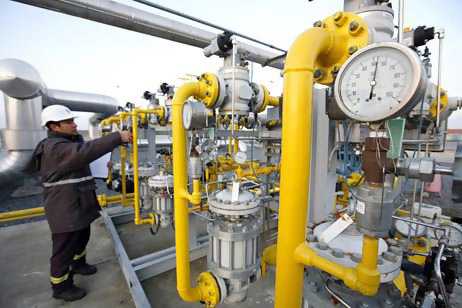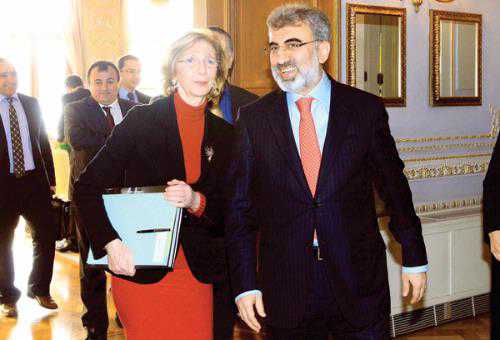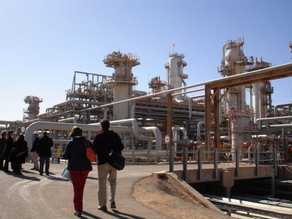Turkey’s big thirst for new power
Florian Neuhof

Turkey is in a rush to grow its energy sector. And recent news that the Abu Dhabi National Energy Company, known as Taqa, will invest heavily in Turkish coal-fired power plants shows how serious Ankara is taking this commitment.
The deal, announced at the start of the year, will see Taqa build and operate a power generation base totalling 7,000 megawatts, or about 10 per cent of Turkey’s electricity needs by the time the plants are completed.
Turkey’s energy minister, Taner Yildiz, is keen to emphasise that efforts will be taken to minimise the environmental impact of the country’s power sector.
The plants will be fed with lignite, a soft brown coal reviled by environmentalists for the emissions its use entails. Lignite is found in Turkey’s soil and offers some relief in the complicated task of securing hydrocarbons from abroad.
Turkey is dependent on imports for 91 per cent of its oil and 98 per cent of its natural gas and it relies heavily on Iran and Russia for its supplies. It is therefore keen to push the share of electricity produced from gas from about 50 per cent to less than 30 per cent in the next decade and to diversify its hydrocarbon sources.
Turkey has reluctantly complied with United States and European Union demands to reduce imports from Iran as part of a new round of sanctions, but its dependence on Iranian supply has meant it has refused to cut economic ties with the country.
Nevertheless, Turkey has announced it will import more Saudi Arabian and Libyan crude to counter the effect of the sanctions on Iran and the trend for Arabian Gulf oil to depart to Asia.
Turkey’s confrontational stance with Syria, Tehran’s long-time ally, could also endanger imports from Iran.
Iraq’s immense oil and gas reserves are another source of hydrocarbons, and a pipeline already flushes 400,000 barrels per day (bpd) of Iraqi crude across the border to the Turkish harbour of Ceyhan. But, rather than focusing on good relations with Baghdad, Ankara seems intent on carving out its own oil and gas base in Iraq by encouraging the autonomous Kurdish north in its efforts to create an independent energy sector.
The Kurdish Regional Government (KRG) and Turkey are close to signing a deal under which the Turks will build production and pipeline capacity in Kurdistan, enabling the Kurds to export their hydrocarbons outside the Iraqi infrastructure.
The KRG’s efforts to take control of its resources is a huge source of irritation to Iraq’s central government. While closer ties with Erbil can serve to secure a great deal of oil and gas supply, the uncertainty of the geopolitics can also undermine future security of supply.
Turkey pays attention to its gas supply in particular. With electricity use projected to rise dramatically in the coming decades, adding further gas imports is crucial in spite of efforts to reduce its share in power generation.
But Turkey also has ambitions to establish itself as a gas-trading hub between the Middle East, gas rich Azerbaijan and Europe. Turkey and Azerbaijan have agreed on the Trans-Anatolian Natural Gas Pipeline project that will connect the latter’s Shah Deniz II gasfield development with the Bosphorus.
Turkish demand for gas stood at about 125,000 cubic metres a day at the end of last year. Before it can think of gaining in status as a transit hub it needs to ensure its own demands are met, experts say.
“It still needs to facilitate additional gas purchases and encourage new developments such as Shah Deniz Phase II and Kurdistan volumes to meet its own requirements,” says Stephen O’Rourke, a gas supply analyst at Wood Mackenzie.
Although piped gas plays the biggest part in Turkey’s thinking, Ankara has remained open to all options. This month, Mr Yildiz announced that he was in discussions with Qatar over an import terminal for liquefied natural gas (LNG).
Another future source of gas could be the Levant Basin, where huge reserves are believed to lie under the deep seabed. But Turkey’s confrontational stance towards Greece and its icy relations with Israel disadvantages Ankara’s position in the Mediterranean, in spite of an exploration agreement with North Cyprus.
If the Levant Basin fulfils its potential and starts yielding large amounts of gas, it could threaten Turkey’s position as a transit hub, analysts predict, as the most direct route to Europe is via Greece. But gas produced there may not be destined to Europe, anyhow.
“We expect LNG to be the most likely export monetisation solution for these discoveries, and consequently Europe is not a guaranteed market for this gas,” says Mr O’Rourke.
Overall, Turkey remains in a strong position to secure the gas necessary for its economic growth and to make it a significant regional hub.
“Turkey should be able to maintain its long-term energy objectives. However, this will become more complicated, given its increasingly complicated relationships with Syria, Iran, Cyprus, and Israel,” says Daniel Wagner, the chief executive of the consultancy Control Risk Solutions.
via Turkey’s big thirst for new power – The National.





